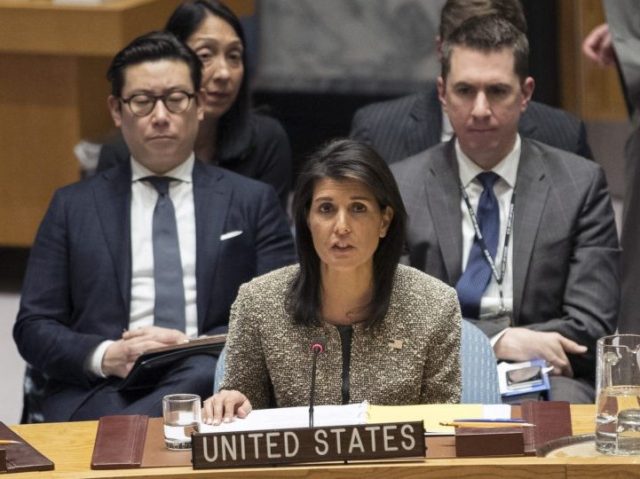The United Nations Security Council held an emergency meeting Wednesday following North Korea’s latest missile test in which South Korea and the United States warned the Kim regime to step back from the brink.
“The dictator of North Korea made a choice yesterday that brings the world closer to war,” U.S. Ambassador to the United Nations (UN) Nikki Haley said at the meeting. “We have never sought war with North Korea, and still today we do not seek it. If war does come, it will be because of continued acts of aggression like we witnessed yesterday. And if war comes, make no mistake, the North Korean regime will be utterly destroyed.”
Haley called on every country to cut “all ties” with North Korea over the launch, calling out those that have refused to do so. “The world knows who they are,” she said in an apparent reference to China, North Korea’s primary sponsor, who she later called out by name as the Kim regime’s main supplier of oil.
Haley said that President Donald Trump called Chinese President Xi Jinping Wednesday morning, asking him to cut off oil exports to North Korea.
The country most threatened by the launch, the Republic of Korea (South Korea), echoed this stern warning. “If North Korea continues to underestimate or miscalculate the firm resolve of the international community, it will transpire to be a grave mistake,” South Korean Ambassador to the UN Cho Tae-yul said Wednesday at the Security Council Meeting. “North Korea should be awakened from its false sense of security. We urge the Peyongyang, once again, to seize the rapidly closing window of opportunity to resolve its nuclear program peacefully and thereby ensure its security.”
These calls come after the reclusive dictatorship resumed ballistic missile testing after a pause of several months. Some defense analysts are concerned the tests may indicate North Korea is perfecting its long-running nuclear weapons program, illegal under the Nuclear Non-Proliferation Treaty from which it withdrew in 2003 and numerous UN Security Council resolutions. Taiwanese diplomatic sources claimed the missile landed in water within Japan’s exclusive economic zone. Secretary of Defense James Mattis told reporters that incident is being taken “very seriously” by the administration.
Taiwan, another member of the long-running anti-communist coalition in East Asia, expressed its concern over the launch. Taiwanese President Tsai Ing-wen’s office issued a statement Wednesday reading, “President Tsai instructed government agencies to ensure that all possible response measures are at the ready … and rigorously implement all relevant sanctions to jointly maintain regional stability and order.”
Ahead of the Security Council meeting, the U.S. State Department made clear that the United States will be willing to negotiate with the pariah state. At a regular press conference Tuesday, after the launch, State Department Spokeswoman Heather Nauert told reporters:
[W]e have always been very clear that we would be open to talks with North Korea, but that North Korea – and we would have said this last week, we would have said this 24 hours ago – is not showing any serious signs of wanting to sit down and have conversations with the world, with the global community, about the peace and stability and denuclearization of the Korean Peninsula. So 24 hours ago they weren’t prepared to talk; today they certainly aren’t prepared to talk.
As Nauert noted, the United States is already engaged in talks with regional allies South Korea and Japan over the launch under the auspices of a United Nations (UN) body set up to fight the communists in the Korea War:
The United States, in partnership with Canada, will now convene a meeting of the United Nations Command Sending States to include the Republic of Korea and Japan and other key affected countries to discuss how the global community can counter North Korea’s threat to international peace.
Nauert did not confirm if that group was considering new sanctions against the already heavily isolated North Korea.

COMMENTS
Please let us know if you're having issues with commenting.